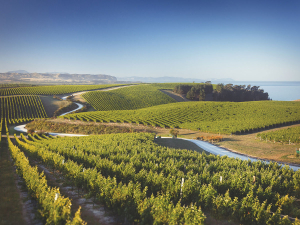The further companies go on the carbon reduction journey, the steeper the climb, says Yealands Sustainability Manager Andree Piddington.
Yealands was certified as Toitū Carbon Zero from the winery’s 2008 inception, and in 2020 became a member of International Wineries for Climate Action (IWCA), an association of 48 wine producing companies across 12 countries, committed to becoming net zero by 2050 across Scopes 1, 2, and 3, without the use of external offsets.
Dropping its offsetting purchases meant moving Yealands’ Toitū certification from Carbon Zero to Carbon Reduce. Since 2022 it has earmarked funds previously used for carbon credits for initiatives to reduce emissions, and on biodiversity plantings on site, which can be used for ‘insetting’. The company, which is one of eight Gold members of the IWCA, has an interim goal of emissions reductions by 2030, which meets the requirements of the United Nations Race to Zero.
With efficiencies gained through lightweighted glass, bottling a portion of wine offshore, and using both a winery and Marlborough Lines solar array to reduce fossil fuel use in the winery, they are now working with the likes of freight forwarders and glass suppliers to reduce their downstream and upstream emissions.
“We have to work with them to try and reduce their emission profiles, which in turn reduces ours,” says Andree, who recently joined the IWCA board. As suppliers and transport operators become more aware of the need for third party certified emissions reductions, that process is becoming easier. “When we first started out, it wasn’t quite like that. There’s a lot more common awareness and common goals there… it will be slow, but you’ve just got to take one step at a time and one bite of the bloody elephant.”
Felton Road, with Silver membership, is the only other New Zealand wine company in IWCA, and Andree hopes more will get on board, seeing the value of belonging to a programme with a unified vision, shared insights and experiences in reducing emissions, and knowledge on what international markets are seeking from sustainable producers. It is also a global recognised certification, based on the ISO 14,064 , she says. “Market barriers are only becoming tougher, and a lot of our customers are now recognising IWCA as a rigorous certification.”
iwcawine.org












